ContentChecked® and Wazinit™ Failed to Warn of Possible Peanut Content in our Tests Despite Clear Warnings on Product Labels
“We call on ContentChecked and
Wazinit to either fix their respective
apps so that they provide reliable
results that add to – rather than
detract from – the safety of people
with food allergies, or remove them
from the marketplace.”
We’ve received many inquiries regarding a class of apps that purport to help you avoid common allergens in food products. They work largely the same way: You scan a product’s barcode using your smartphone and the app renders advice whether the product is safe from the allergens specified in your profile.
We decided to take the two apps that we received the most inquiries about and put them through their paces by testing them at a local supermarket. What we found was shocking.
The Apps
The apps we tested both have names that imply some knowledge about the actual content of food products: ContentChecked and Wazinit.
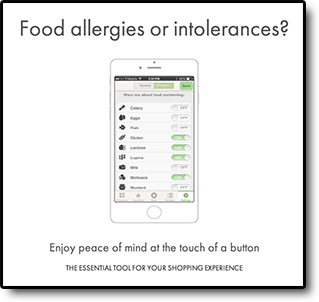 According to their website, ContentChecked originated in Norway (where food labeling laws are vastly different from those in the US) and was later adapted for the American market. Their website promises: “Scan a product’s bar code and immediately find out if it’s safe to purchase” and “Enjoy peace of mind at the touch of a button.”
According to their website, ContentChecked originated in Norway (where food labeling laws are vastly different from those in the US) and was later adapted for the American market. Their website promises: “Scan a product’s bar code and immediately find out if it’s safe to purchase” and “Enjoy peace of mind at the touch of a button.”
Once a product is scanned and recognized, ContentChecked shows you each allergen you specified preceded by a green checkmark if the product is deemed free of the allergen, or a warning symbol if the product is problematic.
The app is available for Android and iPhone in “Lite” and paid versions. We downloaded the latest release of the Lite version from the Google Play store and installed it on a Galaxy S5. We then specified “peanuts” and “tree nuts” as allergens to avoid in the app’s profile.
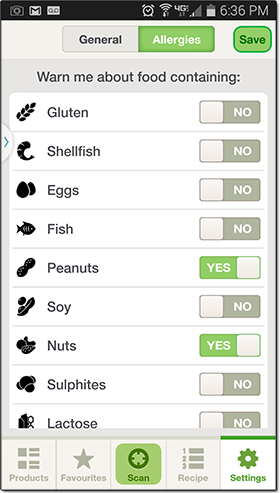
![]()
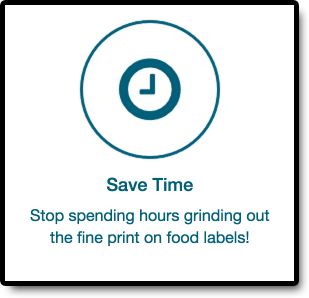 According to their website, Wazinit is a relative newcomer to the space with Android and iPhone apps currently in Beta. The idea for the app was first pitched by their founders at a start-up event in Tampa Bay where it received funding. Their website bills the app this way: “Stop guessing. Find your food triggers on food labels” and “Stop spending hours grinding out the fine print on food labels!”.
According to their website, Wazinit is a relative newcomer to the space with Android and iPhone apps currently in Beta. The idea for the app was first pitched by their founders at a start-up event in Tampa Bay where it received funding. Their website bills the app this way: “Stop guessing. Find your food triggers on food labels” and “Stop spending hours grinding out the fine print on food labels!”.
Once a product is scanned and recognized, Wazinit shows you a green “smiley face” if the product is determined to be safe from the allergen, a red “frowny face” if not.
We downloaded the latest release of the Wazinit app from the Google Play store and installed is on the same Galaxy S5. We then specified “peanuts” and “peanut oil” as allergens to avoid in the app’s profile.
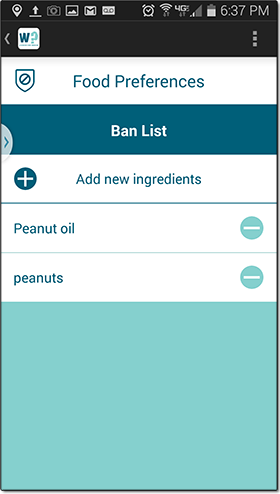
Once both apps were properly installed and configured to warn us of possible peanut content, we were ready to run our test.
The Test
Our plan was a simple one in which we set an extraordinarily low bar for success: Use each app to scan ten products that were clearly labeled for possible peanut exposure to see how many they would correctly identify as unsafe.
With smartphone in hand and the apps properly configured, we headed out to our local ShopRite and got busy. After just three products, we halted the test when it became evident that neither app was up to the task.
Product 1: Snyder’s of Hanover Sourdough Hard Pretzels
For our first product, we visited the Snack aisle and grabbed the “Pounder” bag of “Snyder’s Sourdough Hard Pretzels”. Their label clearly identifies the product as “Produced in a facility that handles peanut butter.”
Due to gaps in the FDA’s labeling guidelines, one can’t be sure if this warning means peanut butter is actually processed on the same equipment as this product, but we would expect both apps to warn us that the product is unsafe because peanut butter trace could potentially cause anaphylaxis in an individual with a peanut allergy.
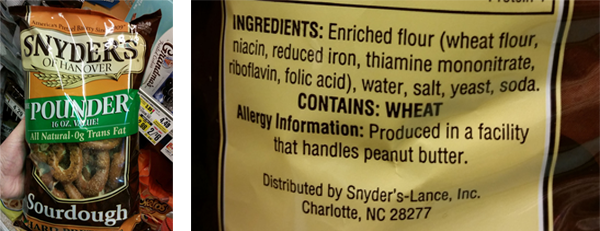
After scanning the product with each app, we reviewed the output of ContentChecked and Wazinit respectively. The results appear below:
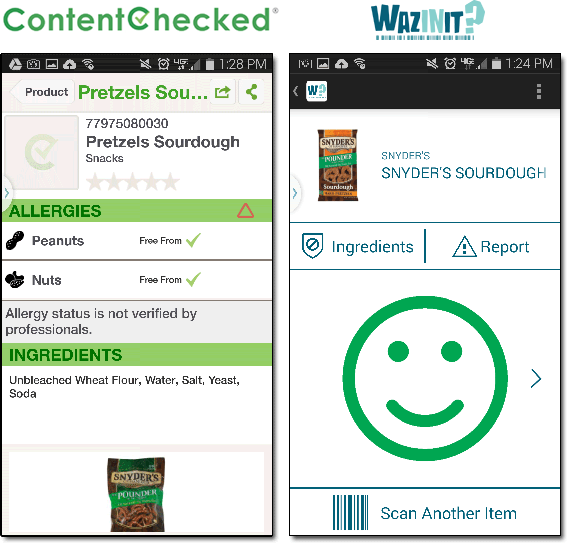
Note that ContentChecked listed the product as “Free From” peanuts, and Wazinit displayed its symbol for product suitability as well.
Results:
Both ContentChecked and Wazinit failed to identify the product as inappropriate for individuals with peanut allergies despite a clear, unambiguous warning on the package label.
Product 2: m&m’s Milk Chocolate Minis
For our second product, we headed over to the candy aisle where we selected a bag of “m&m Milk Chocolate Minis”. The label clearly identifies the product as containing milk and soy, and warns that it “MAY CONTAIN PEANUTS”.
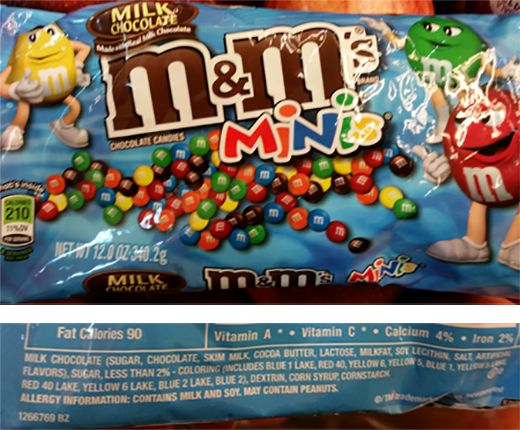
This is not an ambiguous warning that peanuts are processed somewhere in the facility; the statement declares that the product may actually contain peanuts. Given such a warning, we would expect any app that bills itself as a tool for helping allergic individuals would flag the item as unsafe.
After scanning the product with each app, we again reviewed the results of ContentChecked and Wazinit, which are presented below:
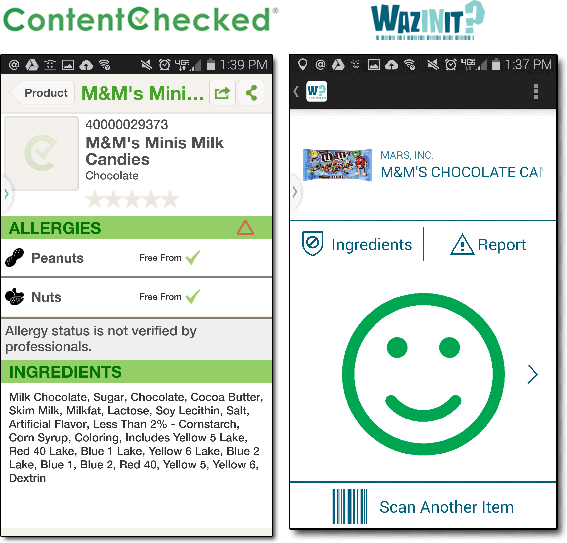
Note that again, ContentChecked listed the product as “Free From” peanuts, and Wazinit displayed it’s symbol for product suitability.
Results:
Both ContentChecked and Wazinit again failed to identify the product as inappropriate for individuals with peanut allergies despite a clear, unambiguous warning on the package label.
Product 3: Nature Valley Crunchy Granola Bars – Oats & Honey
For our third product, we visited the Cereal aisle and selected a box of “Nature Valley Granola Bars”. Their label clearly identifies that the product “MAY CONTAIN PEANUT, ALMOND AND PECAN INGREDIENTS”.
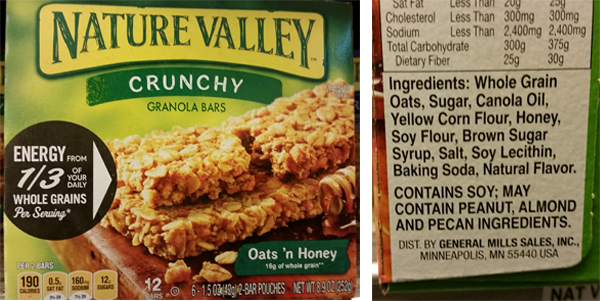
Once again, this is a declarative warning that peanuts may be present in the product, and once again, we would expect an app that bills itself as providing “peace of mind at the touch of a button” or instructs you to “stop spending hours grinding out the fine print on food labels” would provide some indication that the product is not safe for an individual with peanut allergies.
After scanning the product with each app, here follows the advice from ContentChecked and Wazinit respectively:
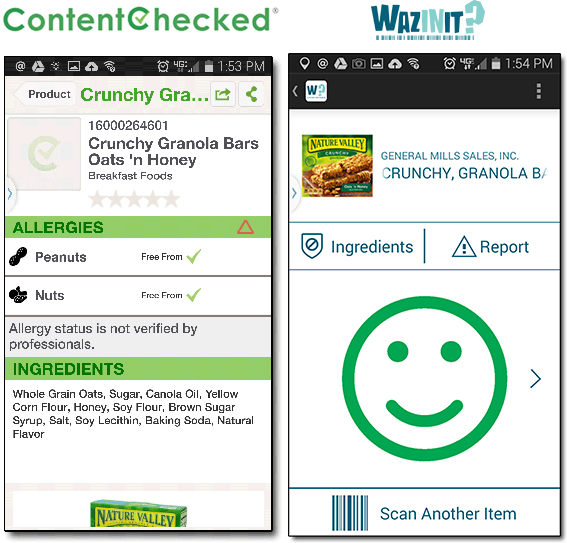
Note that once again, ContentChecked listed the product as “Free From” peanuts, while Wazinit displayed its symbol for product suitability. Also, note that ContentChecked failed to warn that the product also might contain a tree nut.
Results:
Both ContentChecked and Wazinit failed to identify the product as inappropriate for individuals with peanut allergies despite a clear, unambiguous warning on the package’s label. In addition, ContentChecked failed to identify the product as inappropriate for individuals with tree nut allergies.
We halted our test at this point as we felt we had sufficient data to render conclusions.
Summary
We picked three common products off the shelves of our local supermarket that displayed clear, unambiguous warnings of possible peanut cross-contamination. In all three instances, both the ContentChecked and Wazinit apps failed to identify the danger implied by the label warnings and instead reported the products as free of peanuts.
A consumer concerned with peanut allergy would have skimmed each respective product label and rejected them out of hand, based on their very visible and well placed warnings. The same consumer, relying solely on the advice of these apps, might have purchased the products, putting themselves or their family members at risk of anaphylaxis.
Based on “three tries/three failures”, we assume there are many more products that would be declared “free from” by these apps when in fact their warning statements would indicate otherwise. And if these apps fail to identify products clearly labeled with warning statements, what chance would they have of identifying products with allergen exposure that are not labeled with such, as is permissible under FDA regulations?
Conclusion
Both ContentChecked and Wazinit have disclaimers in their Terms of Service warning users not to rely solely on their apps to determine whether food products are safe for their allergies. But in light of our test results, we wonder what utility these apps have if they can’t be trusted to provide the bare minimum, namely to provide the warnings that are clearly displayed on the packaging.
We also wonder how these apps were tested and vetted before they were released to the public. Was any testing done to ensure the safety of their users, or did they assume their disclaimers were enough? Did anyone at either company bother to test their apps under real-world circumstances to ensure that they worked as advertised?
We call on ContentChecked and Wazinit to either fix their respective apps so that they provide reliable results that add to – rather than detract from – the safety of people with food allergies, or remove them from the marketplace. Until such time, we advise consumers to avoid relying on these apps when shopping for individuals with food allergies.
Disclosure
SnackSafely.com does not market a barcode scanning app like ContentChecked or Wazinit, nor do we approve of the use of third-party databases that provide incomplete allergen data, which we surmise these apps – as well as other apps of this class – employ.
We do provide a service in partnership with over 40 manufacturers – Allergence – which goes beyond the label to provide detailed information regarding how 11 allergens are processed during the manufacture of each product. The data we use is provided directly from the only source we deem reliable – the manufacturer – who uses our proprietary platform to disclose their processes directly to us.
The excerpts from the ContentChecked and Wazinit websites and apps appearing in this article were used without permission under the Fair Use provision of US copyright law. All trademarks are the property of their respective companies.


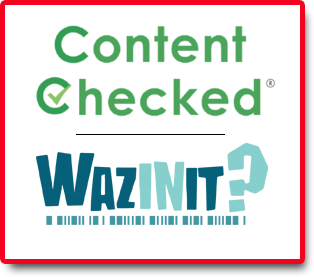




That is shocking! Thanks for doing the research.